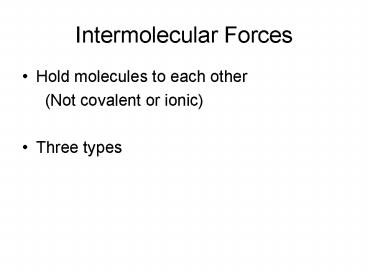Intermolecular Forces PowerPoint PPT Presentation
Title: Intermolecular Forces
1
Intermolecular Forces
- Hold molecules to each other
- (Not covalent or ionic)
- Three types
2
London Forces
- vander Waals or Induced Dipole
- All molecules
- Short-lived
3
(No Transcript)
4
London Forces
- Increase with increasing molecular weight
5
(No Transcript)
6
London Forces
- Increase with more spread out molecules
- 2,2-dimethylpropane, bp 9.5ºC
- pentane, bp 35ºC
7
Dipole-Dipole Forces
- Polar molecules permanent dipole
- Positive and negative ends attract
- Butane, MW58.0 g/mol, bp -0.5ºC
- Acetone, MW58.0 g/mol, bp 56.2ºC
8
(No Transcript)
9
Hydrogen Bonding
- Hydrogen bonded to highly electronegative element
- Fluorine, Oxygen and Nitrogen (FON)
- Structures of Ammonia and Water
- Boiling points
10
(No Transcript)
11
(No Transcript)
12
(No Transcript)
13
Density of Water
- 1.00 g/mL at 4C
- Decreases as temperature increases or decreases
- Ice is less dense than water
14
(No Transcript)
15
(No Transcript)
16
Vapor Pressure and Boiling Point
- Vapor Pressure
17
(No Transcript)
18
- Boiling point is the temperature at which the
vapor pressure is equal to atmospheric pressure. - Normal boiling point is the temperature at which
the vapor pressure is equal to 760 mm Hg
19
(No Transcript)
20
- Boiling Point
- Intermolecular Forces
- Molecular Shape
21
Solids
- Crystalline solids
- Amorphous solids
- See display case behind SB168
22
(No Transcript)
23
Phase Changes
- Heat of Fusion amount of heat energy (cal)
required to change a substance from the solid to
the liquid form - Heat of Vaporization - amount of heat energy
(cal) required to change a substance from the
liquid to the gas form
PowerShow.com is a leading presentation sharing website. It has millions of presentations already uploaded and available with 1,000s more being uploaded by its users every day. Whatever your area of interest, here you’ll be able to find and view presentations you’ll love and possibly download. And, best of all, it is completely free and easy to use.
You might even have a presentation you’d like to share with others. If so, just upload it to PowerShow.com. We’ll convert it to an HTML5 slideshow that includes all the media types you’ve already added: audio, video, music, pictures, animations and transition effects. Then you can share it with your target audience as well as PowerShow.com’s millions of monthly visitors. And, again, it’s all free.
About the Developers
PowerShow.com is brought to you by CrystalGraphics, the award-winning developer and market-leading publisher of rich-media enhancement products for presentations. Our product offerings include millions of PowerPoint templates, diagrams, animated 3D characters and more.

